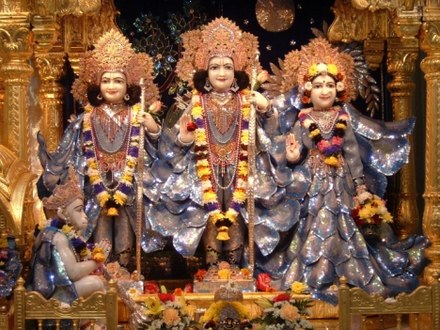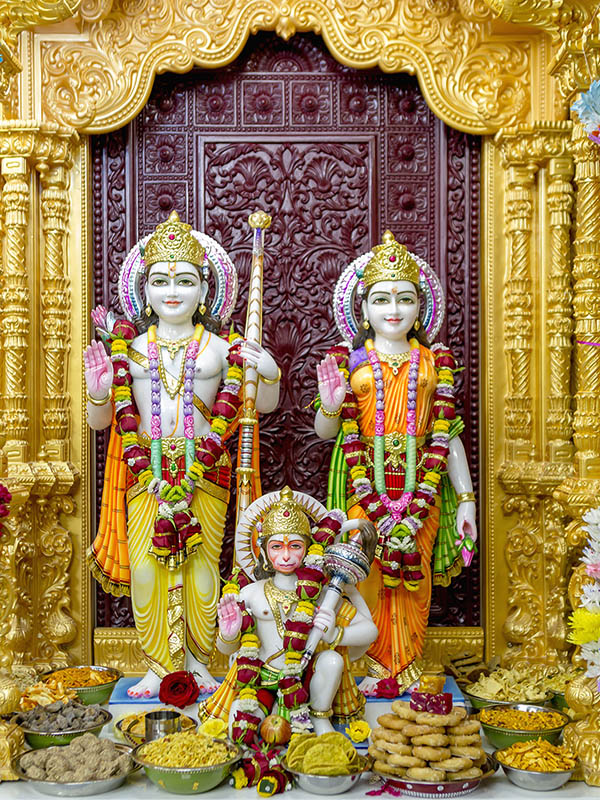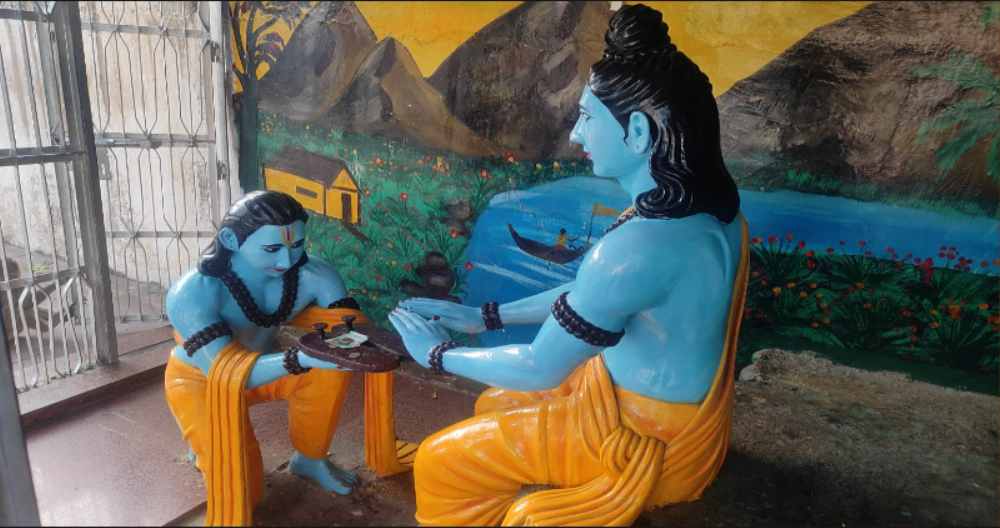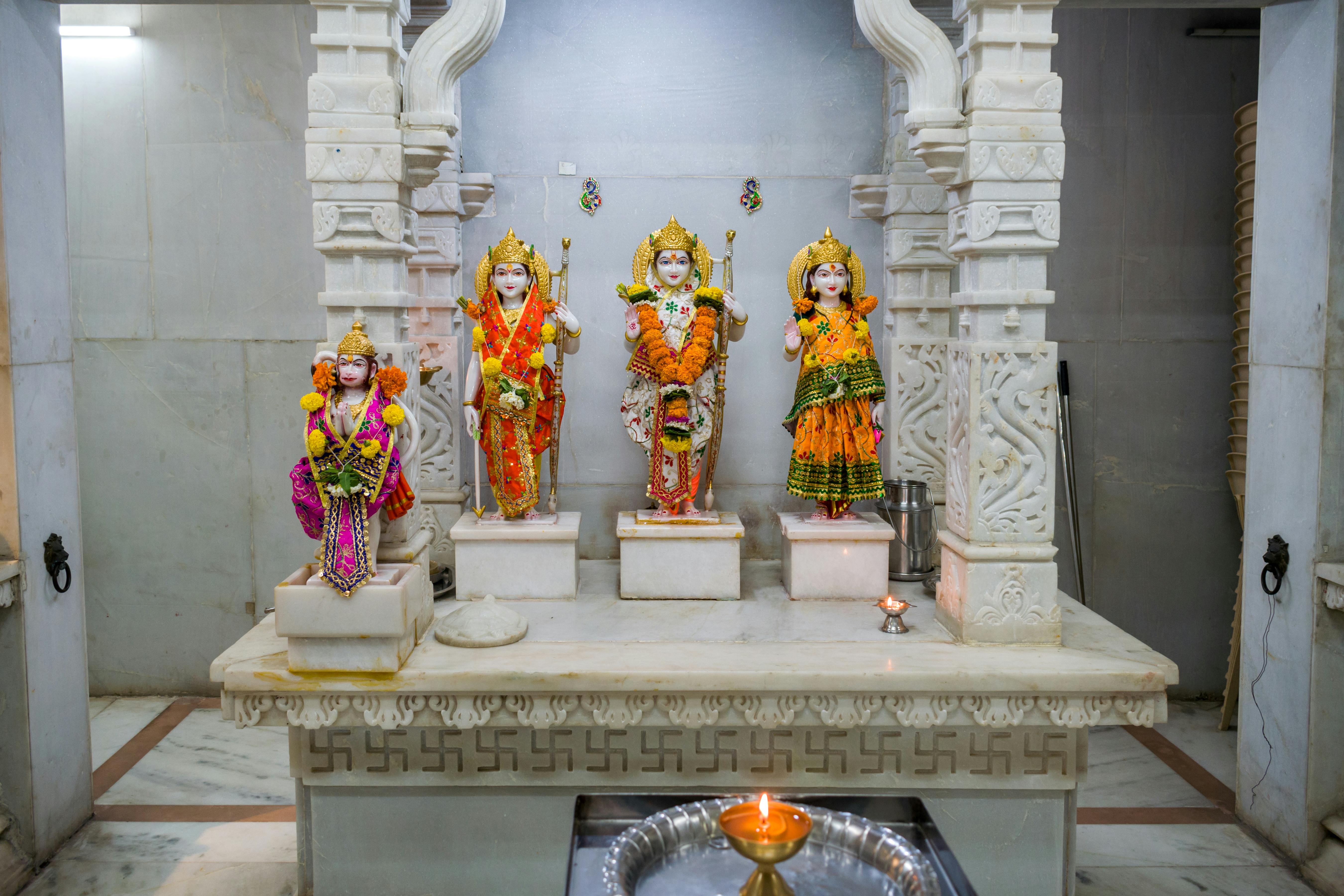Vinay Patrika (68)
Goswami Tulsidas, steeped in devotion and wisdom, continues to guide seekers on their spiritual journey. The powerful compositions that emphasize the supreme importance of chanting the name of Lord Ram.
The Three-Fold Suffering
राम राम राम जीह जौलौं तू न जपिहै।
तौलौं, तू कहूँ जाय, तिहूँ ताप तपिहै ॥ १ ॥
“O soul! As long as you do not chant Ram’s name with your tongue, until then, wherever you go, you will continue to burn in the three types of suffering.”
Tulsidas ji begins with a stark warning and a beautiful promise. The three types of suffering (Tihun Taap) refer to:
- Adhyatmik Taap – Suffering from within (mental, emotional, spiritual distress)
- Adhibhautik Taap – Suffering from other beings (conflicts, diseases, worldly troubles)
- Adhidaivic Taap – Suffering from divine/natural forces (storms, fate, planetary influences)
The Saintly poet emphasizes that without divine remembrance, no place on earth, no matter how comfortable or prosperous, can provide refuge from these fundamental human sufferings. The key phrase is “jaulon tu na japihai”, as long as you don’t chant. This isn’t about mechanical repetition, but a heartfelt remembrance.
Spiritual Poverty
सुरसरि-तीर बिनु नीर दुख पाइहै।
सुरतरु तरे तोहि दारिद सताइहै ॥ २ ॥
“Even standing on the banks of the holy Ganges (Sursari), you will suffer thirst without water; even beneath the wish-fulfilling tree (Kalpataru), poverty will torment you.”
This verse presents two powerful paradoxes that reveal the emptiness of material proximity without spiritual connection:
Imagine standing beside the sacred Ganges, a river that flows endlessly, that purifies, that sustains millions, yet dying of thirst. This is the condition of one who has access to divine grace but doesn’t drink from it. The holy river represents God’s infinite mercy, always available, always flowing. But without the vessel of Ram Naam, we cannot receive it.
The Kalpataru (celestial wish-fulfilling tree) grants whatever one desires. Yet beneath its abundant branches, the spiritually disconnected person remains poor. This shows that even if all material wishes were fulfilled, without divine grace, the soul remains impoverished, empty, and suffering.
The message is clear: spiritual poverty is the root poverty. All the holy places, all the abundance of the world mean nothing if the heart is not aligned with the divine through His name.
The Inescapable Cycle of Suffering
जागत, बागत सपने न सुख सोइहै।
जनम जनम, जुग जुग जग रोइहै ॥ ३ ॥
“While awake, while sleeping, even in dreams, nowhere will you find happiness. Birth after birth, age after age, you will weep in this world.”
Tulsidas ji paints a comprehensive picture that leaves no escape route for the soul that has turned away from divine remembrance:
All States of Consciousness:
- Jagat (awake) – In your conscious, daily life
- Bagat (sleeping) – In deep sleep
- Sapne (dreams) – Even in the dream state
No state of being provides refuge. This isn’t meant to create despair but to awaken us to reality. Without spiritual grounding, the mind carries its suffering everywhere , into work, into rest, even into the subconscious realm of dreams.
All Dimensions of Time:
- Janam janam (birth after birth) – Through the cycle of reincarnation
- Jug jug (age after age) – Through all cosmic time periods
- Jag roihai (weeping in the world) – Continuous suffering in worldly existence
This verse emphasizes that the problem isn’t situational but fundamental. Changing circumstances won’t help; only inner transformation through divine remembrance can break this cycle.
The Inversion of Reality
छूटिबे के जतन बिसेख बाँधो जायगो।
ह्वैहै बिष भोजन जो सुधा-सानि खायगो ॥ ४ ॥
“The more you try special efforts to free yourself (while remaining averse to Ram’s name), the more tightly you will be bound. Even nectar-like food will become poison for you.
This is perhaps the most psychologically profound verse in the composition. Tulsidas ji reveals a disturbing truth:
Effort Without Grace–
“Chutibe ke jatan bisekh bandho jaygo” – The very special efforts you make to free yourself will bind you more tightly. This speaks to the futility of ego-driven spiritual practice. When we try to “achieve” liberation through our own power alone, forgetting divine grace, we create more bondage. Our efforts become another trap, another source of pride, another chain.
The Inversion of Experience–
“Hwaihai bish bhojan jo sudha-sani khaygo” – Food mixed with nectar (amrit) will become poison for you. This is the terrifying inversion that happens when we’re spiritually disconnected. Everything becomes reversed:
- Pleasure becomes pain
- Success becomes suffering
- Even spiritual practices become obstacles
- Blessings feel like curses
Why? Because without the inner alignment that comes from divine remembrance, we cannot properly receive or digest anything, material or spiritual. Our inner state poisons everything we consume.
This verse isn’t about giving up effort but about ensuring that all effort is grounded in divine remembrance, in surrender, in grace.
The Fish and Water – Ultimate Dependence
तुलसी तिलोक, तिहूँ काल तोसे दीनको।
रामनाम ही की गति जैसे जल मीनको ॥ ५ ॥
“O Tulsi! For one as humble as you, across the three worlds and through all three times (past, present, future), there is only one refuge, the name of Shri Ram, just as fish depend entirely on water.”
In this concluding verse, Tulsidas combines profound humility with absolute faith:
The Three Worlds (Tilok):
- Heaven (Swarg lok)
- Earth (Prithvi lok)
- Underworld (Patal lok)
The Three Times (Tihun Kaal):
- Past (Bhoot)
- Present (Vartman)
- Future (Bhavishya)
Across all dimensions of space and time, Tulsidas declares his complete dependence on Ram Nam.
The Fish-Water Metaphor:
“Jaise jal meenko” – Just as (the life of) fish depends on water. This is one of the most beautiful spiritual metaphors:
- A fish cannot survive even a moment without water
- Water is not something the fish occasionally needs; it’s the very medium of its existence
- The fish doesn’t just drink water; it lives, moves, breathes in water
- Separation from water means immediate death for the fish
Similarly, the devotee recognizes that Ram Nam is not an occasional spiritual practice but the very element in which the soul truly lives. Without it, we may appear to be alive, but we’re spiritually dying with every moment.
Self-Identification as “Deen”:
Tulsidas calls himself “deen” (humble, helpless, poor). This isn’t false modesty but spiritual wisdom. By recognizing his complete dependence, he opens himself fully to grace. Pride says, “I can do it myself.” Humility says, “Without You, I am nothing.” And in that surrender, everything becomes possible.
Deep psychological wisdom:
- The mind needs an object. If we don’t give it the divine, it will obsess over worldly concerns and create suffering.
- Repetition creates grooves in consciousness. What we repeatedly think about shapes our inner landscape. Ram Nam creates pathways of peace.
- Sound has power. Sacred mantras work on vibrational levels beyond their literal meaning, affecting our subtle body and consciousness.
- Humility opens the heart. Pride blocks grace; surrender allows it to flow.
The Simple, Profound Path
In our complex modern world, with its countless spiritual paths, therapeutic techniques, and self-improvement methods, Tulsidas JI offers something beautifully simple: remember the divine name.
Not as magic words that will make problems disappear, but as a practice that:
- Realigns us with our true nature
- Connects us to the source of all peace and joy
- Transforms our relationship with suffering
- Opens us to grace
- Makes every moment sacred
The verses progress from warning to promise, from universal truth to personal testimony. They don’t demand blind faith but invite us to test this truth in the laboratory of our own lives.
As Tulsidas himself demonstrates through his immortal works, this isn’t merely poetry or theology; it’s tested truth, the lived experience of countless devotees across centuries who discovered that the name of the divine is indeed like water to the fish: the very element in which we truly live, move, and have our being.
In a world full of noise, the whisper of Ram Naam is the most powerful silence, one that leads straight to peace, freedom, and bliss.
राम राम राम








